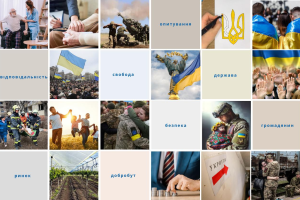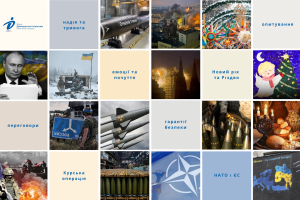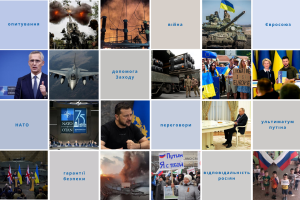The all-Ukrainian opinion poll was conducted by Ilko Kucheriv Democratic Initiatives Foundation together with Razumkov Centre Sociological Service from April 22 to 29, 2021 in all regions of Ukraine except Crimea and the occupied territories of Donetsk and Luhansk oblasts. A total of 2,021 respondents aged 18 years and older were interviewed. The theoretical sampling error is 2.3%.
The survey was financed as part of the Kingdom of the Netherlands Embassy's MATRA Programme.
- 41% of Ukrainian citizens believe that Ukraine should celebrate both dates — the Day of Remembrance and Reconciliation on May 8 and Victory Day over Nazism on May 9. Another 31% believe that Ukraine should only celebrate Victory Day over Nazism on May 9. About 9%, on the contrary, support the idea of celebrating only the Day of Remembrance and Reconciliation on May 8. The rest 10% of respondents do not care. The celebration of only May 8 is more supported by respondents from the Western macro-region (22%). In the East and South, more respondents believe that only May 9 should be celebrated (42% and 48%, respectively).The idea of celebrating both dates prevails among all age groups except the group over 60, as well as among the electorates of all parties except «Opposition Platform — For Life» party. The idea of celebrating both dates is also more popular among supporters of Ukraine's accession to the EU, but among opponents of European integration—the majority thinks that it is appropriate to celebrate only May 9.
- 48% of Ukrainians agree that World War II was an outcome of a conspiracy between Hitler and Stalin to divide spheres of influence in Europe according to the Molotov–Ribbentrop Pact. 29% do not agree with such statement, and 23% are undecided. The majority of Ukrainians in the Western, Central and Southern regions agree with this statement. While in the Eastern macro region, there are approximately equal shares of those who agree and disagree with the statement about the common responsibility of the two dictators for the beginning of the World War II.
Among the youngest age group (18–29 years old) 50% agree with this statement and 22% disagree. Among all the other age groups, most also agree with this statement. The gap between those who agree and those who disagree becomes smaller as the age of the respondents increases. The same opinion prevails among the electorates of all parties except for «Opposition Platform — For Life». - 46% of Ukrainians agree that the Soviet Union could have not won the war against Nazi Germany without the help of the Western Allies of the Anti-Hitler Coalition. 35% do not agree, another 19% are undecided. Most residents of the Western macro-region agree with this. In the Central, Southern and Eastern macro regions, the distribution of opinions resembles national distribution. Young people are more likely to agree with this statement: in the group of 18–29 y.o. 51% agree and 29% disagree, while the older generation (people 60+ y.o.) is divided: 43% agree and 39% disagree).
- 25% of Ukrainians believe that the Victory Day is primarily a celebration of the Anti-Hitler Coalition's victory in World War II. 37% call this day a celebration of the Soviet people's victory in the Great Patriotic War. 25% do not share any of these statements. The Soviet interpretation is still present in the Central, Southern and Eastern macro regions. Interestingly, nearly half of the residents of the South and East (41% and 46%, respectively) chose none of these options.
- 46% of Ukrainians have a positive attitude towards the decision of the Ukrainian authorities to recognize soldiers of the Ukrainian Insurgent Army (UPA) as fighters for the independence of Ukraine. 29% are against it, 9% of respondents do not care, and another 16% were undecided. The majority supports this decision in the Western and Central macro regions (80% and 47%, respectively). In the Southern and Eastern macro regions, 20–25% support this decision. Also in the Central, Southern and Eastern macro regions there are about 20% of those who have not yet decided on their attitude, but these people do not express a negative attitude to the recognition of UPA soldiers as fighters for the independence of Ukraine. Young people are more likely to support this decision (50% "for" and 19% "against" among the 18–29 age group, and among people over 60, 42% "for" and 39% "against"). There are age differences within regions as well. In particular, 30% of the young people in the South and East of Ukraine support this decision 30% do not support this decision, and the rest do not care about it.
- 43% of Ukrainians support the decision to ban public use and wearing of the Georgian ribbon, 29% are against it, 16% respondents that they do not care, and 13% are undecided about the matter. In the Western and Central macro regions, the majority of respondents supports this decision (64% and 47%, respectively). 27% in the South and East support the decision; 33% in the South and 43% in the Eastern region do not. This decision is supported by the electorates of all parties, except for «Opposition Platform — For Life» party.
- 62% of Ukrainians have negative assessment of Joseph Stalin as a historical figure. The majority of residents in all regions agree with this: 78% and 69% of citizens in the West and the Center think so, while in the South and Center—45% each. In the Southern and Eastern regions, about 35% of respondents consider Stalin's actions both positive and negative. 12% of the residents of the Eastern macro region assess Stalin’s actions mostly positive, although in other macro regions this share is substantially and even less in other regions.
- The activity of Stepan Bandera as a historical figure is considered positive by 32% of respondents, the same number of respondents consider his activity negative. Another 21% think that is was both positive and negative. A positive attitude prevails in the Western macro region (70%). In the Central macro region, 27% each consider his activity positive or negative, and another 27% consider it as much positive as negative. A negative attitude prevails in the Southern and Eastern macro regions, where Bandera's activity is considered negative for Ukraine by 54% and 48%, respectively, while positive view of Bandera is shared only by 11% in both macro regions. A significant share of residents of the South and East consider Bandera's activity both positive and negative (15% and 25%, respectively). Young people are more likely to consider Stepan Bandera a historical figure whose activity was rather positive for Ukraine.
- 36% of "Servant of the People" party’s supporters consider Stepan Bandera a positive historical figure, while 27% consider him a negative one. Among the supporters of «Opposition Platform — For Life» only 4% positively assess the contribution of Stepan Bandera to the history of Ukraine, while 63%—negatively. On the contrary, supporters of the «European Solidarity» party predominantly assess the figure of Stepan Bandera positively (57%), only 12% of supporters of this party assess it negatively.
- 40% of Ukrainians have not heard of the "Immortal Regiment" event. 27% of citizens have heard about it and have a positive attitude, 11% are aware of it and have a negative attitude. Most respondents in the Western and Central macro regions have not heard about this event at all (54% and 45%, respectively). Most respondents who are aware and have a positive attitude about this activity live in the South and East of Ukraine (46% and 35% respectively).








